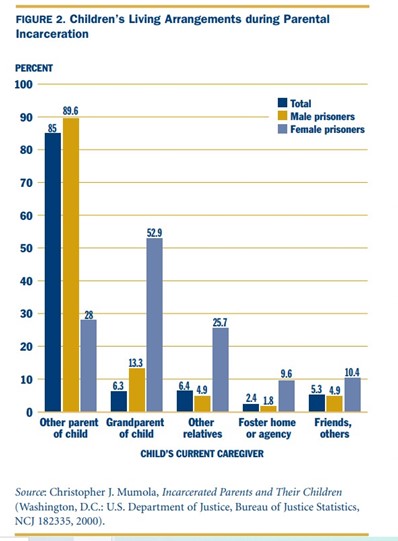Summer break is upon us, which means kids are home from school with their families. Some may be planning vacations, while others may be relaxing at home.
For children of inmates, their living situation often changes when their parent is imprisoned. When they go to live with a relative or in another environment, this change is known as “kinship care”.
Types of Kinship Care
The U.S. Bureau of Justice provides the following statistics on how kinship care arrangements of children of inmates can shift:

-There are 500,000 children of inmates in Central Texas, which means that these kids are under some form of kinship care.
-Nearly 90% of children continued living with their mother after their father was imprisoned.
-Nearly 53% of children went to live with a grandparent when their mother was imprisoned.
-10% of children of incarcerated fathers, and 2% of children of incarcerated mothers were placed in foster care.
-In one estimate by the Adoption and Foster Care Analysis and Reporting System (AFCARS), anywhere between 7% and 40% of children of inmates had been placed in foster care at some point in their childhood.
-Parents whose children have been in foster care for 15 out of the last 22 months can have their parental rights terminated, unless it would not be in the child’s best interest.
As shown above, in the majority of cases, children are placed with other relatives before being placed in institutionalized care. However, exceptions exist, especially if living with either parent is not deemed in the child’s best interest, or if extended relatives do not live close by to support the family.
Benefits of kinship care:
- Provides love and care in a familiar setting;
- Provides parents with a sense of hope that children will remain connected to their birth families;
- Enables children to live with people they know and trust;
- Reinforces a child’s sense of cultural identity and positive self-esteem;
- Helps a child make and sustain extended family connections;
- Continues lifelong family traditions and memories;
- Supports the child in building healthy relationships within the family;
- Supports the child’s need for safety and well-being; and
- Creates a sense of stability in the life of a child.
Challenges of kinship care:
- Changes in family dynamics and daily life;
- Feelings of anger, sadness, loss, guilt or other emotions;
- Transitioning from a more enjoyable role (ie: doting grandparent) to the authority figure and rule enforcer;
- Having difficult conversations with children about why they cannot live with their parents;
- Making decisions about children’s health or other daily life situations;
- Navigating their relationship with the birth parent(s).
Thus, there are many complex factors at play for both children and their surrogate caregivers when the parents are arrested and taken away.
Sparks is there for these children of inmates who are experiencing significant changes and limited support to cope, all while developing and growing up and trying to learn. Your support can help them transition and adjust to the new reality of their living situation.
Donate Today
P.S – Want to learn more about the types of questions or topics kinship caregivers need to consider? Check out this article: https://cwig-prod-prod-drupal-s3fs-us-east-1.s3.amazonaws.com/public/documents/f_kinshi.pdf?VersionId=hsjh.qpq9B8VsKJ6tqTX5CKkvRJ802Kp
Sources:
https://www.urban.org/sites/default/files/publication/50461/310882-Families-Left-Behind.PDF

